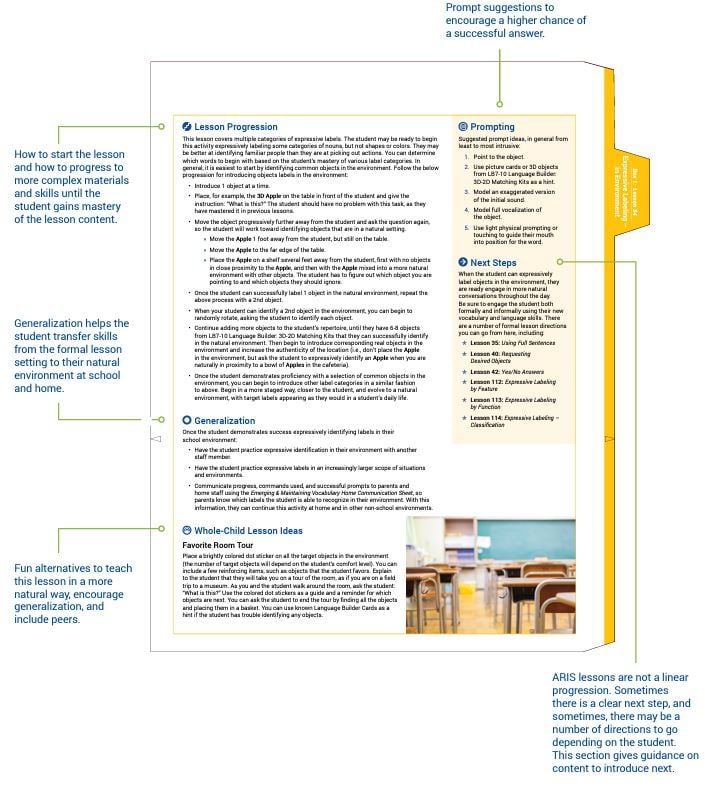ARIS Lessons - 7 Content Categories
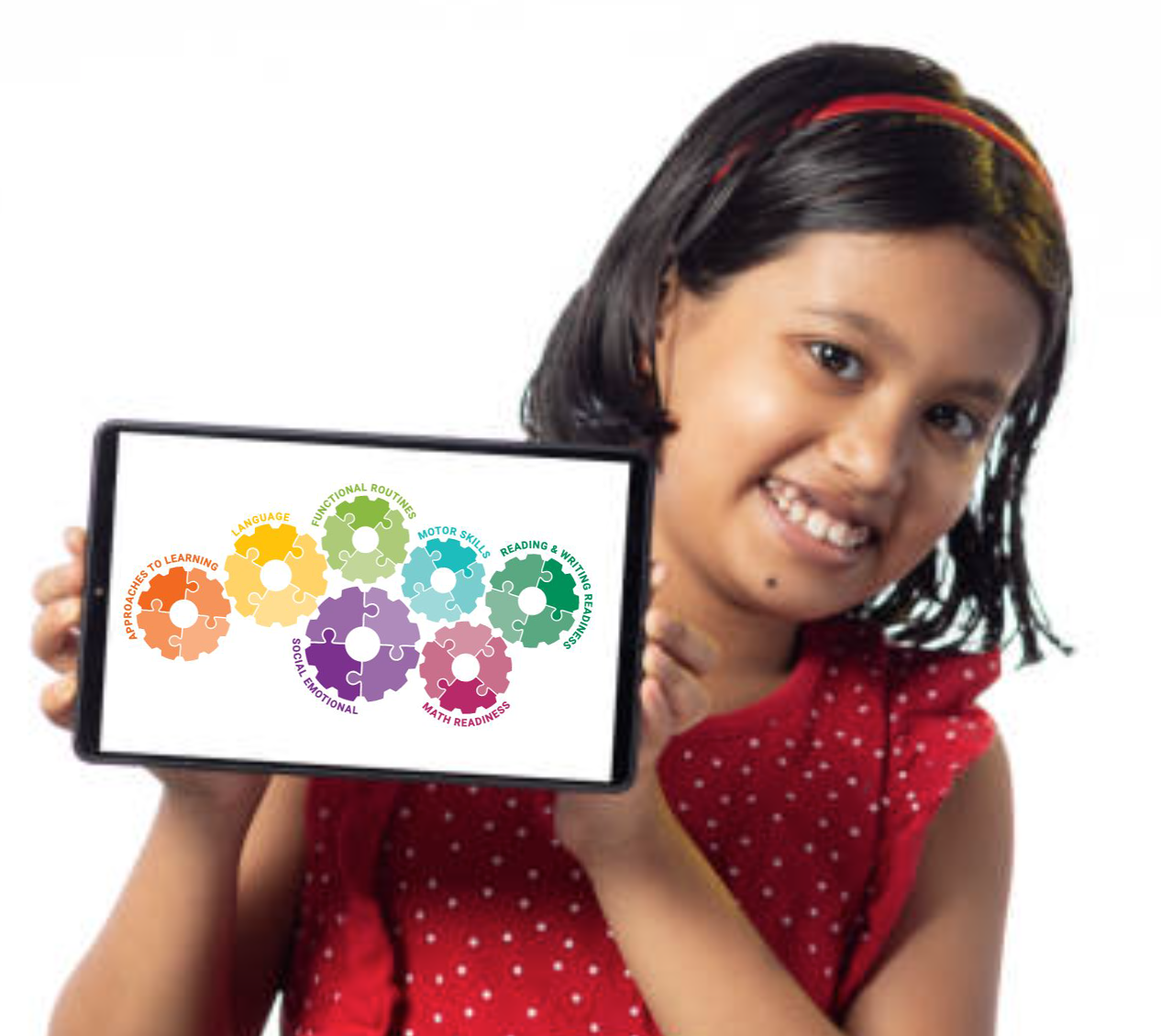
 Approaches to Learning
Approaches to Learning
 Language
Language
 Social Emotional
Social Emotional
 Functional Routines
Functional Routines
 Motor Skills
Motor Skills
 Reading & Writing Readiness
Reading & Writing Readiness
 Math Readiness
Math Readiness
202 Lessons
Individual lessons are broken down into discrete steps that create a ladder to academic readiness.
Scroll down for a list of all ARIS lessons... with 20 FREE Lessons to use right away!
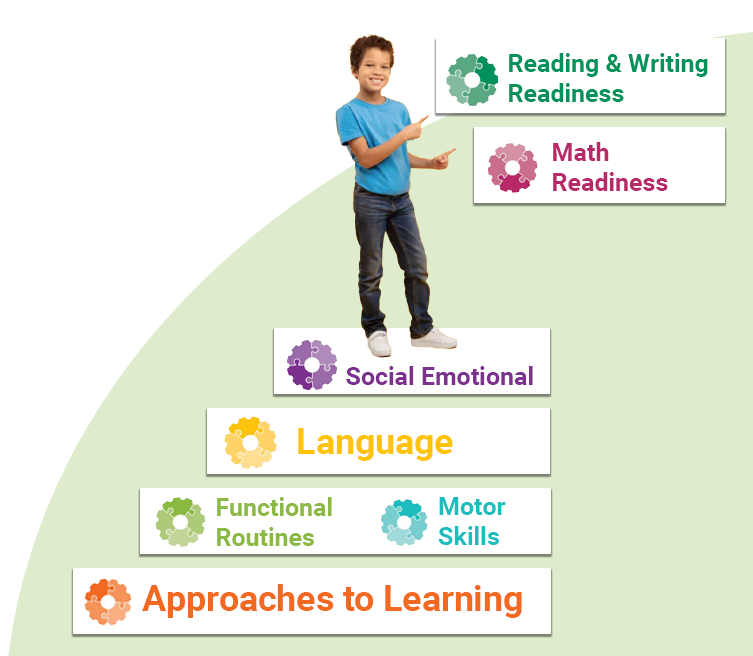
ARIS Full Lesson List
ARIS educational framework is designed to prepare students... particularly those with special needs or learning differences like autism... for academic success.
Below you will find a full list of the ARIS Lessons.
The lessons in bold are yours to download, print and use right away, with our compliments!
Stage 1
Approaches to Learning Content Category - Stage 1
The Approaches to Learning content category contains the foundational lessons that prepare students for success in the Language Builder: ARIS program and beyond. In fact, the skills learned in this category can be seen as learning to learn.
| Approaches to Learning | ||
| Attention & Imitation | ||
| 1 | Pairing & Accepting Reinforcers | |
| 2 | Giving Up Reinforcers | |
| 3 | Responding to Name | |
| 4 | Come Here | |
| 5 | Ready to Learn | |
| 6 | Eye Contact | |
| 7 | Waiting | |
| 8 | Non-Verbal Imitation | |
| 9 | Verbal Imitation | |
| Following Directions | ||
| 10 | Following Single Verb Commands | |
| 11 | Following Compound Verb Commands | |
| Matching | ||
| 12 | 3D to 3D Matching | |
| 13 | 3D to 2D Matching | |
| 14 | Identical Matching - Common Objects Photos | |
| 15 | Identical Matching - Colors | |
| 16 | Similar Matching - Common Objects |
Language Content Category - Stage 1
Typically developing children pick up language from their environment so naturally that it is easy to forget there are discrete developmental processes at work.
The lessons in ARIS STAGE 1 Language Content Category systematically break down the discrete developmental processes of language acquisition into 30 lessons, ensuring that no steps in the developmental process are missed!
Motor Skills - Stage 1
The ARIS Motor Skills content category contains lessons that will support the development of the fine and gross motor skills most typically developing children acquire prior to entering kindergarten.
Motor skills enable children to participate in social and play-related activities, such as coloring, crafts, and puzzles; sports and recreation; self-help activities like feeding, grooming, and dressing themselves; actions of independent living like opening containers, drawers, and doors; and academic skills, such as writing.
The Motor Skills content category covers Fine Motor and Gross Motor skills in 2 separate subcategories.
| Motor Skills | ||
| Fine Motor | ||
| 47 | Holding Crayon & Scribbling | |
| 48 | Tracing Lines | |
| 49 | Shape Tracing | |
| 50 | Drawing Lines & Shapes | |
| 51 | Coloring Within Lines | |
| 52 | Tracing Simple Pictures & Dot-to-Dot | |
| 53 | Stacking Blocks | |
| 54 | Cutting | |
| 55 | Pasting | |
| 56 | Dressing Skills: Zip, Button, Tie | |
| 57 | Stringing Beads | |
| Gross Motor | ||
| 58 | Throwing | |
| 59 | Bouncing | |
| 60 | Jumping & Hopping | |
| 61 | Skipping | |
| 62 | Expanded Gross Motor |
Social Emotional Content Category - Stage 1
Autistic children and adults often find it hard to recognize emotional responses in others and to manage their own emotions. It is, however, an unfortunate and incorrect perception that people with autism do not feel emotions, or care what others think.
Distinguishing between social motivation and social skills is an important component of helping students with autism develop healthy and happy relationships. While it is accurate that many people with autism struggle with social interaction skills and communication, in particular non-verbal decoding, this doesn’t mean that they don’t want to have friends and socialize. In order to bridge this divide, ARIS lessons systematically address social skills and emotional development to help students avoid isolation due to marginalization and rejection.
| Social Emotional | ||
| Independent Work/Play | ||
| 63 | Block Imitation - Basic Structures | |
| 64 | Block Imitation - Pretend Play | |
| Emotional Health & Wellbeing | ||
| 65 | Matching - 5 Basic Emotions | |
| 66 | Receptive Labeling - 5 Basic Emotions | |
| 67 | Expressive Labeling - 5 Basic Emotions | |
| 68 | Social Narratives | |
| Group Play & Socialization | ||
| 69 | Joint Attention | |
| 70 | Sharing | |
| 71 | Taking Turns | |
| 72 | Participation in Group Songs with Actions | |
| 73 | Playing Games with an Adult | |
| 74 | Playing Games with a Peer | |
| 75 | Recess |
Functional Routines - Stage 1
Functional routines are the routine activities that are necessary for daily living and for establishing quality of life. If a student does not master the ability to complete these routines without assistance, they will need to rely on others to carry out the basic activities of independent living. When learned, these skills can be immediately applied to daily routines, having a substantial positive impact on the students and on their families.
| Functional Routines | |
| Self-Care & Healthy Habits | |
| 76 | Restroom Use |
| 77 | Snack Time |
| 78 | Washing Hands |
| Classroom Routines | |
| 79 | Following a Schedule |
| 80 | Arrival |
| 81 | Departure |
| 82 | Circle Time |
| 83 | Transitions - Activities |
| 84 | Transitions - Locations |
| 85 | Center Time |
| 86 | Classroom Tasks |
| 87 | Token Board |
| 88 | Increasing Distance of Instructor |
Math Readiness - Stage 1
Research shows that, even as infants, children are intuitively sensitive to mathematical concepts, such as quantity, well before they have any capacity to understand the concept of numbers. Toddlers even develop a rudimentary understanding of counting, adding, and subtracting through daily activities and play.
Parents and educators naturally build upon these early intuitions by noticing and naming numbers as they come up in the student’s environment. Concepts of math, number recognition, and counting have certainly been a part of your daily classroom routines, and have worked their way into circle time, recess, story time, and other lessons.
| Math Readiness | |
| Geometry | |
| 89 | Identical Matching - Shapes |
| 90 | Receptive Labeling - 2D Shapes |
| 91 | Expressive Labeling - 2D Shapes |
| 92 | Sorting by Shape/Color/Size/Style |
| 93 | Object Placement |
Stage 2
Approaches to Learning Content Category - Stage 2
| Approaches to Learning | |
| Following Directions | |
| 94 | Following Single Directions Away from Seat |
| 95 | Following Compound Directions Away from Seat |
| Sorting & Classifying | |
| 96 | Sorting by Category |
| 97 | Sorting by Feature/Function |
| 98 | Listing Members of a Set |
| 99 | Set Exclusions |
| Understanding Concepts of Time | |
| 100 | First, Next, Last -Sequencing Pictures |
| 101 | First, Next, Then, Last with Commands |
| 102 | Relating Activities to Time |
| Recall & Recital | |
| 103 | What Did You Do? Immediate Recall of Single Action |
| 104 | What Did You Do? Immediate Recall of Multiple Actions |
| 105 | What Did You Do? Delayed Recall |
| 106 | First, Next, Then, Last: Immediate Recall |
| 107 | First, Next, Then, Last: Delayed Recall |
Language Content Category - Stage 2
| Language | |
| Receptive | |
| 108 | Receptive Labeling - Features |
| 109 | Receptive Labeling - Functions |
| 110 | Receptive Labeling - Classification |
| 111 | Receptive Labeling - Gender Identification |
| Expressive | |
| 112 | Expressive Labeling - Feature |
| 113 | Expressive Labeling - Function |
| 114 | Expressive Labeling - Classification |
| 115 | Expressive Labeling - Gender Identification |
Social Emotional Content Category - Stage 2
| Social Emotional | |
| Independent Work/Play | |
| 118 | Functional Use of Play Objects |
| 119 | Scripted Story Play |
| 120 | Art Projects |
| 121 | Drawing, Coloring & Presenting Pictures |
| Emotional Health & Wellbeing | |
| 122 | Identification of Complex Emotion Scenarios |
| 123 | Appropriate Responses to Emotion Scenarios |
| Group Play & Socialization | |
| 124 | Parallel Play |
| 125 | Narrated Play |
| 126 | Playing Games with Multiple Peers |
Functional Routines - Stage 2
| Functional Routines | |
| Self-Care & Healthy Habits | |
| 127 | What Object Would You Use? |
| 128 | Self-Help Sequencing |
| 129 | A Healthy Plate |
| Classroom Routines | |
| 130 | Group Work |
| Community Life | |
| 132 | Community Locations |
| 133 | Safety Signs |
Reading & Writing Readiness - Stage 2
Math Readiness - Stage 2
How are ARIS Lessons Organized?
Lesson Page 1
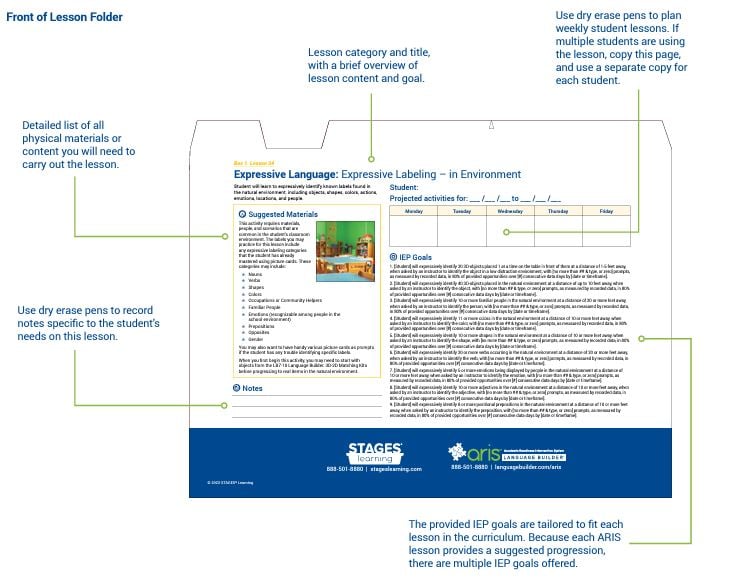
Lesson Page 2
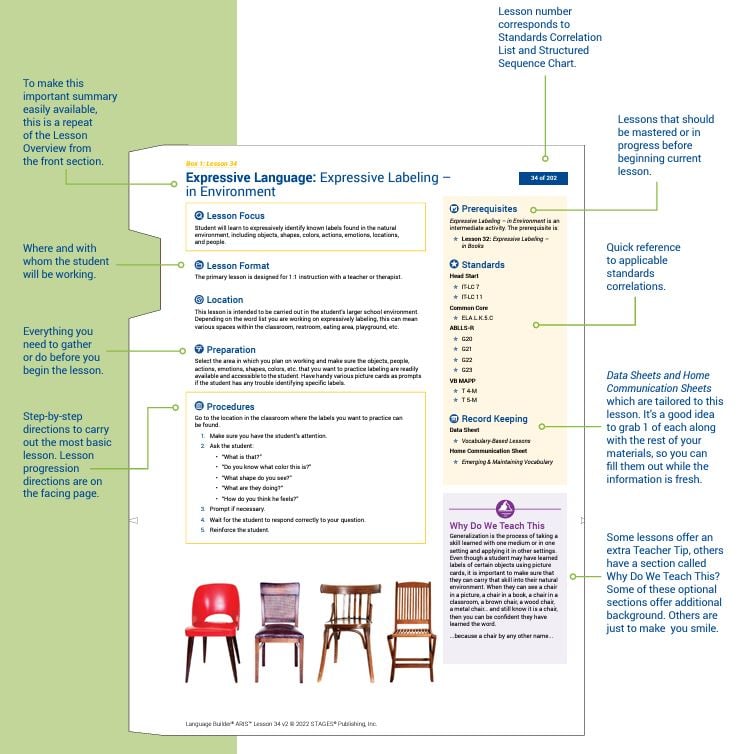
Lesson Page 3
